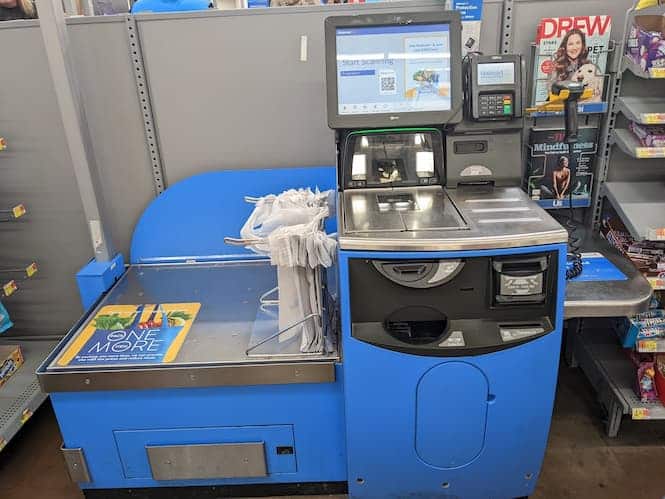
Self-Checkout?
CNN ran an article on “Nobody likes self-checkout”. It made some good points albeit short on any backfill data to support. We talked about it as the only way to make something better is to collect feedback of all sorts. CNN editors are driven by serving audience segments and in the self-service industry we have had to deal with the usual anti-automation, “replaces workers”, and a long list of other complaints. Automation is scary sometimes to many people. For more information email [email protected]
In Brief
- Audio can be irritating — maybe but for the disabled customer the lack of audio can result in very poor outcomes with the “helpful” staff. Imagine you are disabled and getting assistance with the cash back function. That requires trust.
- Survey says “67% experienced a failure” at SCO lanes — there is no source quoted or linked. It appears to be from digital signage firm.
- Disadvantages for stores listed are expensive to install, often break down and lead to customers purchasing fewer items. They incure higher losses and more shoplifting at self-checkout. — not sure where all that data comes from but other sources such as Oliver POS, Capgemini, NCR say otherwise.
- According to Civic Science’s recent U.S. survey, 46% of respondents aged 18-34 prefer using self-service over service with a cashier. Likewise, the NCR states that the main reason customers like self-checkout is the convenience.
- Self-Checkout is still growing. 29% of transactions at food retailers were processed through self-checkout, up from 23% the year prior, according to the latest data from food industry association FMI. — this is a data stat from FMI on supermarkets for sure.
- Why is an unloved technology still proliferating? — Not sure that premise is true. Having multiple ways to checkout for multiple circumstances, while raising number of transactions and lowering cost, seems clear to us. It isn’t generally a one solution fits all given the supermarket shoppers. Aldi and others have developed a focus on those customers wanting quick and fast. They don’t deal with the slow and problematic. A bit unfair but surely optimized.
- The writer calls out CheckRobot as first installed at several Kroger Stores — the real pioneer in the space was Optimal Robotics. In 2001 they hit the 5000 units mark at Kroger. No wonder that Fujitsu bought them in 2004.
- 2004 — IHL’s market study also reported that shipments of self-checkout systems will grow by about 95 percent in 2004, with the market exceeding $1.3 billion in 2005. Greg Buzek, president of IHL, estimates that 95 percent of the supermarket chains in North America will have some degree of self-checkout by 2006. “Self-checkout is an absolute necessity, as supermarkets face pressure from Wal-Mart,” Buzek said. “It allows them to shift employees to higher-profit areas of the store, and it gives them a competitive advantage.”
-
Although self-checkout counters eliminated some of the tasks of traditional cashiers, they still needed to be staffed and created a need for higher wage IT jobs, he said. Self-checkout, Andrews added, “delivers none of what it promises.” — — The intent was not to reduce employees. Hybrid checkouts are complex and of course come with support and maintenance. NCR has an entire building in Bentonville just for self-checkout support staff. Even “just walk out” stores have people, just not in the usual roles and places.
- Despite all of these “shortcomings”, self-checkout is only expanding.
- FOMO (fear of missing out) and the “arms race” drives stores — there is some basis in that but self-checkout was slated to be installed of 95% of stores in 2004 according to IHL Group, who is a smart research firm. We are checking Buzek for comments.
Excerpt
New York (CNN Business)“Unexpected item in the bagging area.”
I am intrigued though on how to make it a better experience. I’ve found that I’m getting much better at the Fujitsu units at my local grocery store. I’m pretty proficient with them and choose to use it whenever I have only a few items. It gets me on my way much quicker. But how to make it fun or pleasurable and not like pumping gas. That is a thought.
Other links
- Walmart supermarket conveyor belts replacing cashiers
- Kroger rolling out conveyor belts for self-checkout
- July 2022 – Walmart Corporate on new Checkout
Problem Areas
Produce —
Self-checkout can be a pain point for shoppers buying produce. More than three in 10 shoppers steer clear of fresh produce when using self-checkout, the Food Industry Association noted in a recent report.
Instead of having to remember the four-digit item code or search through the menu of products to find it, companies like Extenda Retail, KanduAI and Toshiba are looking to make the process simpler and faster with produce recognition solutions. Arigi of Kroger said during NRF that produce recognition software is of keen interest to the grocery chain as it looks to further innovate in self-checkout.
KanduAI, a technology company started in 2018 and headquartered in Tel Aviv, Israel, uses deep learning and artificial intelligence to recognize fruits and vegetables and provide a short list of possibilities to consumers. Shoppers can select if the item is organic or not.
From Grocery Dive
